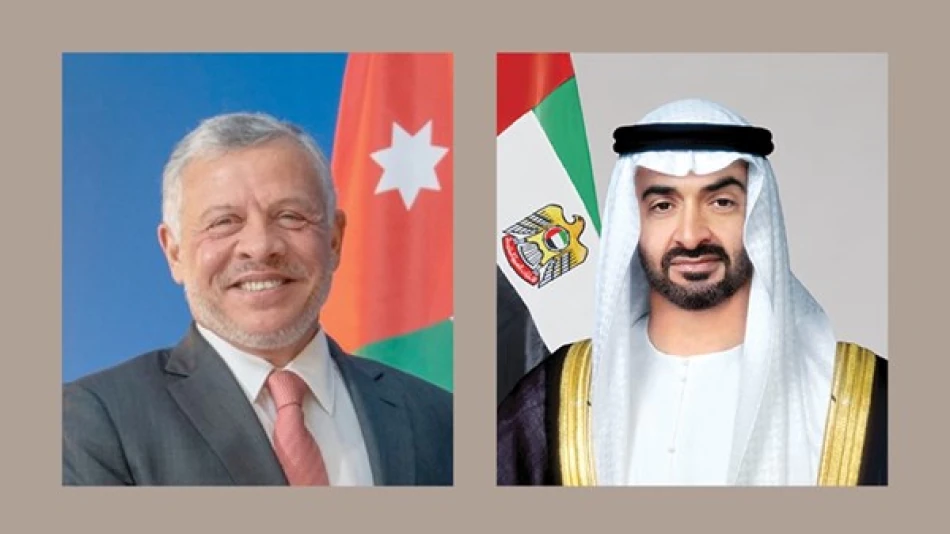
UAE President and Jordanian King Discuss Fraternal Ties, Regional Developments
UAE and Jordan Forge Stronger Alliance Amid Rising Middle East Tensions
UAE President Sheikh Mohammed bin Zayed Al Nahyan and Jordan's King Abdullah II have reinforced their strategic partnership during high-level talks in Abu Dhabi, presenting a united front against Israeli territorial ambitions while positioning their nations as stabilizing forces in an increasingly volatile Middle East. The meeting signals deeper Gulf-Levantine cooperation as regional powers seek alternatives to traditional Western-led diplomatic frameworks.
Strategic Partnership Takes Center Stage
The leaders conducted extensive discussions at Al Shati Palace in Abu Dhabi, focusing on bilateral cooperation and shared regional concerns. Both nations emphasized their commitment to strengthening economic and political ties, reflecting a broader trend of Arab states building stronger intra-regional partnerships independent of external powers.
This cooperation model mirrors successful partnerships elsewhere in the region, particularly the UAE's strategic alliances with Saudi Arabia and Egypt, which have proven effective in advancing shared economic and security interests.
Palestinian Issue Dominates Regional Agenda
Unified Stance Against Israeli Expansion
Both leaders took a firm position against any Israeli moves to annex parts of the occupied West Bank or implement forced displacement of Palestinians. They specifically condemned Israeli settlement expansion plans, arguing these actions fundamentally undermine the two-state solution and threaten regional stability.
This stance represents a significant diplomatic coordination between Jordan, which maintains custodianship over Islamic holy sites in Jerusalem, and the UAE, which normalized relations with Israel through the Abraham Accords in 2020. The positioning suggests that normalization hasn't diminished Arab concerns about Palestinian rights.
Challenging Israeli Sovereignty Threats
The leaders explicitly rejected Israeli statements perceived as threatening regional sovereignty, likely referencing recent Israeli rhetoric toward Jordan and other neighboring states. This represents a notable escalation in diplomatic language, particularly from the UAE, which has generally maintained measured tones regarding Israel since normalization.
Geopolitical Implications and Market Impact
Regional Realignment Accelerates
The UAE-Jordan alignment reflects broader Middle Eastern diplomatic realignment, where traditional alliances are being reassessed. Jordan's economic challenges, including high unemployment and regional refugee burdens, make UAE investment and support increasingly valuable. For the UAE, Jordan offers strategic depth and legitimacy in Arab and Islamic forums.
This partnership could influence regional trade routes and investment flows, particularly as both nations seek to diversify their economies away from traditional dependencies.
Investment and Economic Cooperation
While specific economic agreements weren't announced, the emphasis on "mutual interests" typically precedes major investment initiatives. The UAE has previously invested heavily in Jordan's infrastructure and renewable energy sectors, and this meeting likely laid groundwork for expanded cooperation.
Investors should monitor potential announcements in logistics, technology, and renewable energy sectors, where both nations have strategic priorities.
Broader Regional Context
The meeting occurs as Middle Eastern states increasingly assert independent foreign policy positions. Unlike previous decades when regional diplomacy often followed US or European leads, countries like the UAE and Jordan are crafting autonomous strategies that balance multiple international relationships.
The presence of high-level officials from both sides, including Jordan's Crown Prince Hussein and the UAE's Abu Dhabi Crown Prince, indicates this partnership extends beyond current leadership and represents a long-term strategic commitment.
Looking Forward: Implications for Regional Stability
This UAE-Jordan coordination creates a moderate Arab bloc that could influence broader regional dynamics. Their combined diplomatic weight, economic resources, and strategic positioning make them significant players in future Middle East peace initiatives.
The emphasis on continued consultation suggests both nations are preparing for potential escalations in regional tensions, positioning themselves as responsible stakeholders committed to peaceful resolution of conflicts while firmly defending Arab interests.
Most Viewed News

 Layla Al Mansoori
Layla Al Mansoori






